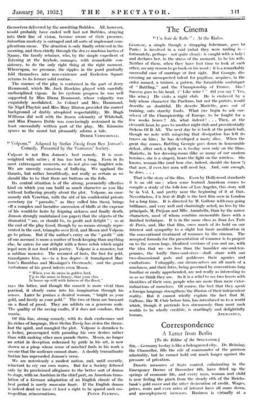The Cinema
"Un Soir de Italic " : At the Rialto.
GEORGIE, a simple though a strapping fisherman, goes to Paris : is involved in a raid (what they were raiding is— fortunately, perhaps—not quite clear): is caught with a lady: and declares her, in the stress of the moment, to be his wife. Neither of them, when they have had time to look at each other, see any reason to go back on his word ; it is a remarkably successful case of marriage at first sight. But Georgie, dis- covering an unsuspected talent for pugilism, acquires, in the order named, a trainer, a patron, the formidable soubriquet of " Battling," and the Championship of France. Alas ! Success goes to his head. (" Like wine ? " did you say ? Yes, like wine.) He visits a night club. He is enslaved by a lady whose character the Puritans, but not the purists, would describe as doubtful. He deserts Mariette, goes out of training, eats starchy foods. What (we begin to ask our- selves) of the Championship of Europe, to be fought for a few weeks hence ? Alt, what indeed ! . . . Then, at the eleventh hour, he goes to another night club and providentially Sickens Of It All. The next day he is back at the punch ball, though we note with misgiving that dissipation has left its traces on him ; he has developed a nasty slice. When the great day comes, Battling Georgie goes down in honourable defeat, after such a fight as is to-day seen only on the films. Mariette, in her dressing-room (like so many of our modern heroines, she is a singer), hears the fight on the wireless. She knows, woman-like (and how else, indeed, should she know ?) that now, if ever, her man will need her. And, sure enough, he does. . . .
That is the story of the film. Even by Hollywood standards it is an old one ; when some learned American cornea to compile a study of the folk-lore of Los Angeles, this story will he in Vol. I, and pretty near the beginning of it at that. Nevertheless, Un Soir de Rolle is the best film seen in London for a long time. It is directed by M. Gallon with easy-going brilliance, and very well and charmingly acted, no less by the principals, M. Prejean and Mlle. Annahella, than by the minor characters, most of whom combine memorable faces with a finished technique. It is in the same class as Sous Les Toils de Paris, and, like that film, owes much of its hold on our interest and sympathy to a slight but basic modification in the conventional treatment of romance by the cinema. The accepted formula for the presentation of romance is to project on to the screen huge, idealized versions of you and me, with the idea that we—no less than the humbler one-and-ten. pennies, the lordly three-and-sixes-,-shall share with our two-dimensional gods and goddesses their agonies and exultations. Unhappily, our dream-selves are all much of a muchness, and their fates, being governed by conventions long familiar or easily apprehended, arc not really as interesting to us as we think they are. So it is a relief to see two lovers with identities of their own, people who arc more than mere exter- nalizations of ourselves. Of course, the fact that they speak a foreign language strengthens the illusion of their independent reality. But it cannot wholly explain the fact that M. Gallon, like M. Clair before him, has introduced its to is world which, though it pretends less strenuously than most such worlds to be wholly credible, is startlingly and delightfully




































 Previous page
Previous page